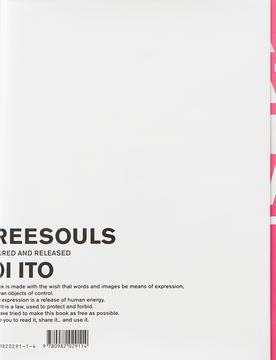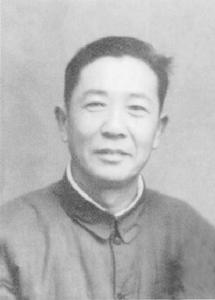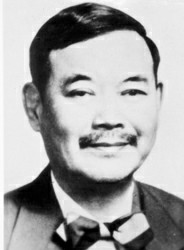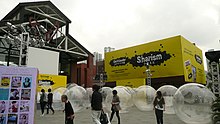
The Renmin University of China is a national key public research university in Beijing, China. The university is affiliated with the Ministry of Education, and co-funded by the Ministry and the Beijing Municipal People's Government.
A number of ethnic groups of the People's Republic of China are not officially recognized. Taken together, these groups would constitute the twentieth most populous ethnic group of China. Some scholars have estimated that there are over 200 distinct ethnic groups that inhabit China, compared to 56 groups are officially recognized. There are in addition small distinct ethnic groups that have been classified as part of larger ethnic groups that are officially recognized. Some groups, like the Hui of Xinjiang with the Hui of Fujian, are geographically and culturally separate, except for the shared belief of Islam. Han Chinese, being the world's largest ethnic group, has a large diversity within it, such as in Gansu, whose Han individuals may have genetic traits from the assimilated Tangut civilization. Although they are indigenous to Hainan island and do not speak a Chinese language, the Limgao (Ong-Be) people near the capital are counted as Han Chinese.

The High School Affiliated to Renmin University Of China (simplified Chinese: 中国人民大学附属中学; traditional Chinese: 中國人民大學附屬中學; pinyin: Zhōngguó Rénmín Dàxué Fùshǔ Zhōngxué), known colloquially as Rendafuzhong (RDFZ), is the high school affiliated with Renmin University of China. RDFZ is situated in the Haidian District of Beijing, within the Zhongguancun Science and Technology Zone. RDFZ is a beacon high school accredited by the Beijing Municipal Commission of Education. The school is a member of the G30 Schools group. A 2016 Organisation for Economic Co-operation and Development (OECD) report described the school as among the most famous in China.

Dayuanshuai was a Chinese military rank, usually translated as grand marshal or generalissimo.
Ding Shisun was a Chinese mathematician, academic administrator, and politician. He served as president of Peking University during the 1989 Tiananmen Square protests and was forced to resign afterwards. He later served as chairman of the China Democratic League from 1996 to 2005 and a vice chairperson of the Standing Committee of the National People's Congress.
The Chinese university ranking is a ranking of universities in mainland China by Netbig, an internet company focused on higher education, founded by Jiang Jining, who graduated from University of Science and Technology of China. The ranking is conducted annually since 1999, and is generally released in July, around the time of college entrance examination. This ranking, however, has ceased to publish newer versions since 2013.

Mao Yushi is a Chinese economist. Mao graduated from Shanghai Jiao Tong University in 1950 and was labeled a 'rightist' in 1958. In 1986, Mao was a visiting scholar at Harvard University, and in 1990, Mao was a senior lecturer at Queensland University.

FREESOULS: Captured and Released by Joi Ito is a book by Joi Ito featuring 296 photographic portraits of members of the free culture movement. The project began in 2007 as way for Ito to freely distribute, through a Creative Commons Attribution license, quality photos of the free culture community without the hindrance of copyright or permission. Freesouls also includes eight essays by major figures in the free culture movement, including Howard Rheingold, Lawrence Liang, Cory Doctorow, Isaac Mao, Christopher Adams, Yochai Benkler, Marko Ahtisaari, and a foreword by Lawrence Lessig. Isaac Mao's essay, "Sharism: A Mind Revolution", introduces Sharism for the first time.

Get It Louder is a Chinese contemporary art festival that began in 2005 and features exhibitions focusing primarily on young Chinese talent within the spheres of art, architecture, design, literature, film and music. Ou Ning helped launch the project with the help of the agency Modern Media and has served as the biennial's main curator for every year to date except 2012. In an interview, Ou said Get It Louder's inception was meant to showcase young Chinese design talent through a series of traveling exhibitions in Beijing, Shanghai and Guangzhou. "Young" in this case is more connected to being "fresh" and "edgy" than a particular age, one of the reasons the older, established artist Ai Weiwei was included in past exhibitions. International, non-Chinese artists and designers have also played a significant part in Get It Louder's exhibitions.
Tong Zhe is a Chinese educator known as the founder of One-Man University, an online learning platform with over 140,000 enrolled students as of 2015

Utopia University, known in Chinese as Datong or Tatung University, was a private university in Shanghai. It was established in March 1912 by a group of former Tsinghua faculty members led by Hu Dunfu, and became one of the most reputable private universities in China. After the founding of the People's Republic of China, the Communist government closed Utopia along with many other private universities in 1952. Its departments, faculty members, and students were divided and merged into various universities in Shanghai.

Shang Yue was a Chinese Marxist economic historian, author and professor at the School of History at Renmin University of China. Before becoming a historian, he also wrote fiction. He taught literature to Kim Il-sung for a short time at Yuwen Middle School in Manchuria. In China, he is primarily known for his work on the idea of the sprouts of capitalism: that proto-capitalism and class struggle had existed in the earlier Chinese history. His purge in 1958 foreshadowed the Chinese Cultural Revolution as his ideas on Chinese economic history conflicted with those of Mao Zedong. After his purge he continued to work on history, but stayed out of public until Mao's death in 1976. His work also gave a lasting effect in Korean nationalist historiography.
Chen Yulu is a Chinese economist, educator, author, and politician who has been president of Nankai University since August 2022. He was vice governor of People's Bank of China from October 2015 to August 2022. He has previously held appointments in the Renmin University of China as the president.

Hu Dunfu was a Chinese mathematician and pioneer in higher education. He won a Qing government scholarship to study at Cornell University, and became the first dean of Tsinghua University at the age of 25. He was then briefly dean of Fudan University, before establishing Utopia University in 1912 and developing it into one of China's best private universities. He also served as head of the mathematics department of National Chiao Tung University and the first president of the Chinese Mathematical Society, which he co-founded in 1935.

China Adolescents Science & Technology Innovation Contest is one of the biggest national science competitions in China held by organizations including China Association for Science and Technology and Ministry of Education of the People's Republic of China. Every year, more than 10 million students from all parts of China submit their projects in local-level competitions and up to 500 projects are eventually selected for the CASTIC. A few top projects are further selected to participate in competitions including Broadcom Masters International, Intel International Science and Engineering Fair, or European Union Contest for Young Scientists.
Chen Mingyuan is a Chinese scholar who works in various disciplines such as linguistics, mathematics, informatics, computer sciences, and modern poetry. On April 23, 1989, Chen gave a speech at Peking University, expressing his support for the student movements and criticisms of the government. This speech was considered a trigger for the later escalation of the 1989 Tiananmen Square protests and massacre.

On September 13, 2021, the Wikimedia Foundation took official actions on the Chinese Wikipedia after investigating users from Wikimedians of Mainland China.
Zhang Wenmu is a Chinese geopolitician and strategist. Zhang is currently a professor at the Center for Strategic Studies at Beijing University of Aeronautics and Astronautics, an executive director of the World Socialism Research Center of the Chinese Academy of Social Sciences, and a director of the China Pacific Society. He is a columnist for Chinese left-wing or nationalist websites such as Utopia, Red Song Society and Guancha. Zhang has a nationalistic political orientation. He is known as China's "hawkish scholar" because he believes that China should continue Mao's ideas in its strategy. Because of his views on maritime power, TheNational Interest called him one of China's first "navalists". Zhang is regarded as China's leading advocates of the theories of the American strategist Alfred Thayer Mahan.
Wen Tiejun is a Chinese agricultural economist who is a professor at the Renmin University of China.
Events in the year 2023 in China.











